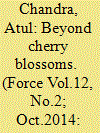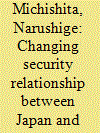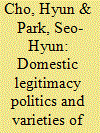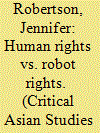|
|
|
Sort Order |
|
|
|
Items / Page
|
|
|
|
|
|
|
| Srl | Item |
| 1 |
ID:
134681


|
|
|
|
|
| Summary/Abstract |
Amidst international furor over its annexation of Crimea, Russia quietly acquired a far more lucrative territory through different means: in March, the United Nations recognized Russia's claim to the resource-rich “Peanut Hole” in the center of the Sea of Okhotsk. This strategically and economically important body of water—a “real Ali Baba's cave” of untapped oil and gas reserves—lies within a contentious triangle formed by eastern Russia and northern Japan. Securing the Okhotsk's legal status as an internal sea goes far to advancing Russian claims in the Arctic, and bolsters Russia's bargaining position over four disputed Kuril islands which Japan callsits “Northern Territories.”
|
|
|
|
|
|
|
|
|
|
|
|
|
|
|
|
| 2 |
ID:
136333


|
|
|
|
|
| Summary/Abstract |
The idea of pacifism dates back to the comprehensive social reforms that were introduced after Japan’s surrender in World War II. The U.S.-led occupying forces carried out a series of democratization and demilitarization policies in a bid to establish a government that would respect other countries and embrace the UN Charter. The U.S. wanted a Japan that would no longer pose a threat to them and to international peace and security. Those policies soon led to a breakdown of Japan’s old systems. In contrast to militarism during the pre-war period, Japan’s U.S.-led social reforms were peaceful. With the gradual evolution of policy adjustments, Japan gradually achieved rapid economic growth and regained recognition from the international community. It apologized for its war-time aggression. Pacifism was widely accepted by the Japanese people and it laid a foundation for Japan’s peaceful development. And so pacifism became part of the Japanese society’s system of values.
|
|
|
|
|
|
|
|
|
|
|
|
|
|
|
|
| 3 |
ID:
135417


|
|
|
|
|
| Summary/Abstract |
The article discusses high-speed rail projects, focusing on the author's explanation of why the technology is not more pervasive across the world. Topics include a discussion of whether high-speed lines are built for speed or to increase capacity; a discussion of the conditions leading to the building of high-speed lines in some countries, but not others; and the history of the first high-speed railway in Japan.
|
|
|
|
|
|
|
|
|
|
|
|
|
|
|
|
| 4 |
ID:
137005


|
|
|
|
|
| Summary/Abstract |
Austronesia, one of the largest language families in the world, covers a vast area from Madagascar in the extreme west to Easter Island in the far east, Taiwan in the north to New Zealand in the south. The languages are spoken by the people of insular southeast Asia, Micronesia, Melanesia and Polynesia in the Pacific, as well as certain parts of the Asia mainland. The vernacular architecture of the people that belong to this language family shows certain shared characteristics that seem to indicate a common origin in the distant past. The Grand Shrines at Ise, Japan pose an intriguing phenomenon because they possess striking architectural features that are reminiscent of Austronesian vernacular architecture. This paper is an attempt to investigate the phenomenon using the findings of studies by experts from other disciplines such as historians, anthropologists, linguists and others, based on the link between culture, language and architecture.1
|
|
|
|
|
|
|
|
|
|
|
|
|
|
|
|
| 5 |
ID:
135629


|
|
|
|
|
| Summary/Abstract |
The ShinMaywa deal could be a harbinger of what may prove to be an extremely fruitful relationship in the aerospace domain between India and Japan. India’s geography makes it ideal for sea plane operations, and especially for humanitarian relief operations, one can only imagine the impact of the US-2i in flood and cyclone relief operations.
|
|
|
|
|
|
|
|
|
|
|
|
|
|
|
|
| 6 |
ID:
135950


|
|
|
|
|
| Summary/Abstract |
This essay shows how a new understanding of the animal – and thus the human – developed in Japan over the course of the nineteenth century. Inspired by Linnaean nomenclature, the delineation of a new ‘animal kingdom’ (dōbutsukai) in Japan led to a radical rethinking of the human place in the natural world. Given early form by the natural historian Udagawa Yōan (1798–1846) in his 1822 Botany Sutra (Botanika kyō), that vision – in which people became ‘animals who can reason’ – carried ramifications for the emergence of the modern sciences in Japan, most notably biology and zoology (dōbutsugaku). By the close of the century, the once-foreign kingdoms of Animalia and Plantae were fully naturalized, and they were quickly put to political use. Fueled by the emerging debate over social evolution, the new natural history gathered a diverse assemblage of living creatures together into a single classificatory kingdom, elevating nomenclature to the level of a natural order that seemed to transcend concerns of individual people even as it gave structure and meaning to their lives. The imagination of the modern ‘civilized’ human being, then, was impossible without the definition of a new animal world.
|
|
|
|
|
|
|
|
|
|
|
|
|
|
|
|
| 7 |
ID:
135932


|
|
|
|
|
| Summary/Abstract |
Japan has long played the role as the main operating base for Korean contingencies. It has also provided rear-area logistic support to the US forces fighting in Korea and helped South Korea build up its defense industrial base. However, the Japan-South Korea relationship has deteriorated in recent years due to short-term political and long-term economic and strategic reasons. At this point, South Korea is bandwagoning with China and deemphasizing its relationship with Japan. China-South Korea relations are not without problems, however, and Japan regards South Korea as one of the most important potential strategic partners in maintaining stability in Asia. In the future, the most decisive factor in determining the direction of the security relationship between Japan and South Korea will be China.
|
|
|
|
|
|
|
|
|
|
|
|
|
|
|
|
| 8 |
ID:
135967


|
|
|
|
|
| Summary/Abstract |
RAISE THE SUBJECT OF TAIWAN WITH ANYONE from the People's Republic of China (PRC)—whether the person is a government official or an ordinary citizen—and you will probably get a vehement and passionate articulation of China's sovereign claim to the island. But Taiwan is not just an emotional hot-button issue in China; rather, it is considered the PRC's most sensitive security issue.
Indeed, Beijing views Taipei as a major rival, or at least as posing a serious security threat. Certainly there are other political entities that China sees as rivals—the United States and Japan come swiftly to mind. It is easy to understand at a glance why Beijing would perceive Washington and Tokyo as rivals—in terms of the magnitude of the economic and military clout of each, as well as the geographic and demographic size of the United States and Japan. In contrast, to the casual observer, Taiwan would not seem likely to be perceived by China as a rival. The balance of power across the Taiwan Strait is extremely lopsided in favor of China. While the island is an economic dynamo and global trading power of considerable significance and possesses a credible defense capability, all these are dwarfed by the gargantuan capabilities of its cross-strait neighbor. Given this glaring asymmetry in the balance of power between China and Taiwan, why would Beijing characterize its relationship with Taipei as a rivalry?
|
|
|
|
|
|
|
|
|
|
|
|
|
|
|
|
| 9 |
ID:
137216


|
|
|
|
|
| Summary/Abstract |
The nature of food risk in Japan has undergone a qualitative change in recent years. This article synthesises insights from psychology, economics, and political science into an interdisciplinary risk approach to show how international relations impact consumer decisions in Japan by outlining how food risks are constructed and framed within existing narrative frameworks. To this end, the article employs two case studies: the gyōza incident in 2008, when poisoned dumplings imported from China caused ten people to fall ill, and contaminated beef incident in 2011, in which five people died and dozens more were hospitalised after consuming raw beef tainted due to industrial negligence. These cases are analysed in the context of Japan's low rate of food self-sufficiency, deteriorating Sino-Japanese relations and the ‘China threat theory’, and perceptions of food safety. The article shows how, despite suffering recent major domestic food contamination incidents and lethal domestic food terrorism, Japanese food is perceived as safe and healthy whereas imported food, and especially Chinese food, is perceived as dangerous and unhealthy. This is exemplified in the domestic response to the two cases: the gyōza incident led to a national outcry, mass hysteria, and calls for a ban on Chinese food imports. Conversely, the raw beef contamination incident – the deadliest case of food contamination in Japan since the 1990s – saw a far more mixed response, as industry, media, and consumers called for the government to allow individuals to take on self-responsibility to mediate their own risks regarding (domestically produced Japanese) food. The article concludes by pointing out that, while behavioural sciences can tell us important things about risk, the political and international context must also be considered.
|
|
|
|
|
|
|
|
|
|
|
|
|
|
|
|
| 10 |
ID:
135294


|
|
|
|
|
| Summary/Abstract |
What drives East Asian regionalism? The rise of China and the perceived decline in the influence of the United States have sparked debates about the future of the regional order, including the yet-unresolved question of whose leadership is likely to be more stable and accepted as legitimate by other regional actors. What is puzzling, however, is that persistent demands for the formation of a coherent and uniquely East Asian regional institution have come not from China or the US, as is the focus of existing studies, but rather Japan and South Korea. In this article, we propose an alternative framework that conceptualises the varieties of East Asian regionalism, emphasising the multiple pivots and variegated levels of politics involved in efforts toward regional cooperation. We find that competing proposals for East Asian regionalism since the 1990s are not determined by structural pressures or the convergence of interests but rather result from domestic legitimacy politics. Japanese and Korean leaders have, at different time periods, proposed their own alternative region-making initiatives appealing to domestically contested views on how best to seek autonomy from the region's Great Powers as a way to enhance their political standing domestically and regionally.
|
|
|
|
|
|
|
|
|
|
|
|
|
|
|
|
| 11 |
ID:
134975


|
|
|
|
|
| Summary/Abstract |
What explains the electoral staying power of many Japanese interest groups in the wake of electoral reform? Electoral explanations provide part of the answer; candidates in elections to both houses of the Diet continue to face incentives—many of them unintended—to court the organized vote. But missing from such accounts is an explanation of why economically noncompetitive groups provide the bulk of such support. The primary reason for this, I argue, is organization. As a result of their historical linkages to the bureaucracy, many interests developed hierarchical, national organizational structures that enabled them to carry out a variety of vote-gathering functions that the parties had trouble performing themselves. Although electoral reform and long-term demographic trends have weakened the electoral influence of interest groups, these organizational complementarities between groups and the parties continue to matter in Japanese elections—including under conditions of two-party competition. To illustrate these points, I trace the evolution of interest group politics from the era of LDP dominance through the rise of two-party competition and the LDP's recent return to power, using postmasters associations and agricultural cooperatives as case studies.
|
|
|
|
|
|
|
|
|
|
|
|
|
|
|
|
| 12 |
ID:
136961


|
|
|
|
|
| Summary/Abstract |
The purpose of this paper is to analyze the defense interdependence between Japan and the United States (US) in the short and long run and to investigate whether Japan is a follower or a free rider of the “US” over the 1975–2009 period. Given that mutual aid between Japan and the US has been maintained, the empirical results suggest that Japanese defense has a stable relationship with US defense. Furthermore, the results reveal that Japan is not a free rider but rather a follower in the period under consideration.
|
|
|
|
|
|
|
|
|
|
|
|
|
|
|
|
| 13 |
ID:
134947


|
|
|
|
|
| Summary/Abstract |
The decision of the International Court of Justice in the Australia/Japan Whaling Case marks an advance in the law of the sea and the obligation on states to cooperate in common ocean resource regimes. The Court found substantially for Australia, prohibiting Japan's long-running program to capture large cetaceans in the Southern Ocean around Antarctica for scientific research. The Court's discussion of the criteria for states to design and implement scientific research whaling programs is assessed, as is the obligation for cooperation in such research and ocean research generally. The result for whaling and for the future work of the International Whaling Commission is considered.
|
|
|
|
|
|
|
|
|
|
|
|
|
|
|
|
| 14 |
ID:
135898


|
|
|
|
|
| Summary/Abstract |
What explains the large variation in the time taken by states to ratify the 1948 Genocide Convention? The costs of ratification would appear to be relatively low, yet many states have waited several decades before ratifying this symbolically important treaty. This study employs a “nested analysis” that combines a large-n event history analysis with a detailed study of an important outlying case in order to explain the main sources of this variation. Surprisingly, the results of our event history analysis suggest that states do not become more likely to ratify once the treaty has become widely adopted by others. We use the case of Japan to examine this relationship in more detail. We argue that once the norm embodied in a human rights treaty develops a “taken-for-granted” character, the rate of ratification can slow down because the marginal costs of additional ratifications begin to outweigh the expected benefits
|
|
|
|
|
|
|
|
|
|
|
|
|
|
|
|
| 15 |
ID:
134904


|
|
|
|
|
| Summary/Abstract |
Examining a series of anti-base protests at Tachikawa Air Force base between 1955 and 1957, this article presents a new interpretation of postwar U.S.–Japanese relations. In contrast to previous emphases on a harmonious U.S.–Japanese partnership, it argues that Japanese desires to secure a representative postwar democracy deeply shaped the U.S.–Japanese alliance by fostering constant tensions, negotiations, and compromises between governments and the public. Using a wide range of governmental and nongovernmental American and Japanese sources, it asserts that these protests ultimately encouraged U.S. policymakers to rethink the utility of U.S. bases in mainland Japan and the broader expression of U.S. Cold War power. By exploring the social, political, and diplomatic tensions surrounding U.S. military bases, this article highlights the vital role that weaker allies and foreign publics played in the U.S. global calculations, policy outcomes, and its understanding of its own role in the world.
|
|
|
|
|
|
|
|
|
|
|
|
|
|
|
|
| 16 |
ID:
135213


|
|
|
|
|
| Summary/Abstract |
WHEREVER ONE looks these days, crises, conflicts and chaos seem to rule. From Tripoli to Tokyo, from Kiev to Caracas, the pace of violence appears to be accelerating. “Looking back over my more than half a century in intelligence,” the director of national intelligence, James Clapper, testified earlier this year, “I have not experienced a time when we’ve been beset by more crises and threats around the globe.
|
|
|
|
|
|
|
|
|
|
|
|
|
|
|
|
| 17 |
ID:
134602


|
|
|
|
|
| Summary/Abstract |
Japan continues to be in the vanguard of human–robot communication and, since 2007, the state has actively promoted the virtues of a robot-dependent society and lifestyle. Nationwide surveys suggest that Japanese citizens are more comfortable sharing living and working environments with robots than with foreign caretakers and migrant workers. As their population continues to shrink and age faster than in other postindustrial nation-states, Japanese are banking on the robotics industry to reinvigorate the economy and to preserve the country's alleged ethnic homogeneity. These initiatives are paralleled by a growing support among some roboticists and politicians to confer citizenship on robots. The Japanese state has a problematic record on human rights, especially toward ethnic minorities and non-Japanese residents who have lived and worked in Japan for many generations. The possibility of robots acquiring civil status ahead of flesh-and-blood humans raises profound questions about the nature of citizenship and human rights. Already the idea of robots having evolved beyond consideration as “property” and acquiring legal status as sentient beings with “rights” is shaping developments in artificial intelligence and robotics outside of Japan, including in the United States. What does the pursuit in Japan of interdependence between humans and robots forecast about new approaches to and configurations of civil society and attendant rights there and in other technologically advanced postindustrial societies?
|
|
|
|
|
|
|
|
|
|
|
|
|
|
|
|
| 18 |
ID:
134948


|
|
|
|
|
| Summary/Abstract |
The case Whaling in the Antarctic (Australia v. Japan) decided by the International Court of Justice is a landmark that introduces new parameters for measuring the “reasonableness” of scientific research by permit under the International Convention on Whaling. However, aspects of these parameters and how they may be applied in future cases remain uncertain. Because the Court's interpretation of the language “for purposes of scientific research” avoids defining scientific research, the Court's decision provides only a limited degree of clarification for States that intend to operate scientific whaling programs under Article VIII of the Convention. The Court's reasonableness test is unlikely to prevent scientific whaling. States who no longer support the dual object and purpose of the Whaling Convention may want to consider negotiating a new international instrument that would be more protective of whales and their habitat.
|
|
|
|
|
|
|
|
|
|
|
|
|
|
|
|
| 19 |
ID:
135968


|
|
|
|
|
| Summary/Abstract |
ON 7 SEPTEMBER 2010, A CHINESE FISHING BOAT collided with two Japanese Coast Guard vessels near the disputed Diaoyu/Senkaku Islands within Japan's claimed exclusive economic zone. The Japanese Coast Guard detained the crew and ship but thereafter let them go, only to hand over the Chinese captain to prosecutors for obstructing its execution of duties. The Chinese government immediately protested to Japan and demanded the release of the captain. The situation only calmed down in late September when the Japanese government set the captain free but refused to apologize or give compensation.
|
|
|
|
|
|
|
|
|
|
|
|
|
|
|
|
| 20 |
ID:
137102


|
|
|
|
|
| Summary/Abstract |
After World War II, the colonial government in the Netherlands East Indies (NEI) prosecuted more than 1,000 Japanese nationals for war crimes committed against mostly Dutch and Indonesian citizens during the Japanese occupation of the NEI (1942-1945). This article examines the unique Dutch approach to prosecuting war crimes at so-called “Temporary Courts-Martial,” including the applicable rules governing evidence, jurisdiction, and punishment. It also looks at representative war crimes trials by offense and analyzes death and non-death sentences imposed by the tribunals. Finally, it offers some overall conclusions about these trials in military legal history.
|
|
|
|
|
|
|
|
|
|
|
|
|
|
|
|
|
|
|
|
|